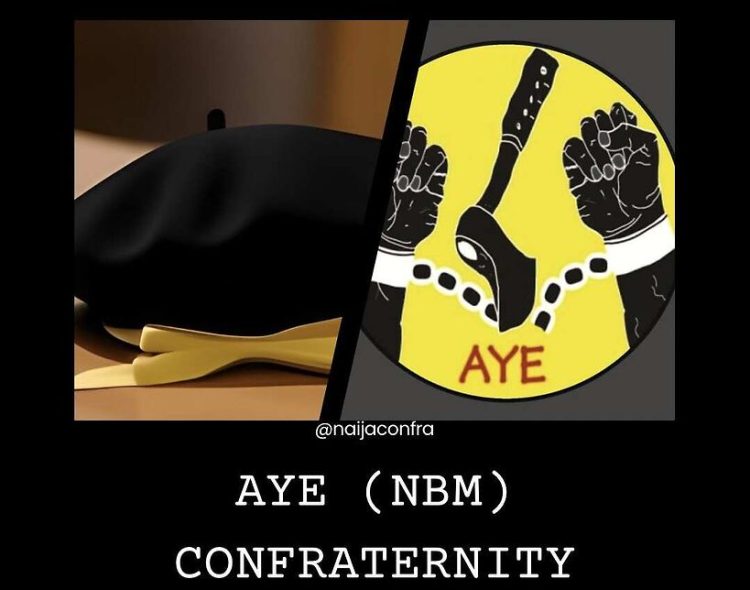Every July 7, members of the Aye Confraternity popularly known as Black Axe mark what they call Metal Day, a sacred date embedded deep in the secretive history of one of Nigeria’s most controversial student groups.
While many young Nigerians scroll past this date with no second thought, for Axemen, 77 isn’t just a calendar date; it’s a coded reference, a symbol of identity, and a call to spiritual awakening. But what really lies behind this infamous date? And what should every Nigerian youth know about it?
Origin: Aye, the Confraternity That Calls Itself a Movement
The Neo Black Movement of Africa (NBM), also called Aye Confraternity, was founded in 1977 by nine students of the University of Benin. These founders; Nicholas Idemudia, John Okogie, Uche Alumona, Tokunbo Brown, Godwin Ehigiator, Olagunju Ojo, Marvel Akpoyibo, Bernard Ojishua, and Gbolahon Dosunmu claimed to be inspired by Pan-Africanist ideals and a desire to empower Black youth.
They named their brotherhood Aye (meaning African Youth Empowerment), adopting the motto: “Social Justice and Equity for All.” Unlike older confraternities like the Pyrates (founded by Wole Soyinka and others), the Aye Confraternity focused on land as its elemental symbol casting members as “land warriors” whose spiritual mission ends in Uhuru (Swahili for freedom).
Their ultimate mantra? “Uhuru must be achieved.”
What Does July 7 (77) Symbolise?
The date July 7 or 77 is the most sacred on the Aye calendar. It’s not just an anniversary; it’s an encoded identity. The number 7 holds deep symbolic value to the confraternity, representing the shape of the axe; an emblematic weapon and icon used by the group. Their core code, 0147, corresponds to tools of the trade:
- 0 – Beret
- 1 – Cutlass
- 4 – Gun
- 7 – Axe
The repetition of 7 (as in 77) reflects power, duality, and unity within their ranks. On Metal Day, members reaffirm their commitment to the ideals of Uhuru and brotherhood. The day is often marked by covert gatherings, coded speeches, traditional chants, and sometimes rituals that reflect their mythical and militaristic ethos.
Secret Temples, Slangs, and Spiritual Practices
Each university where Aye exists is referred to as a High Temple. Here are a few known examples:
- Futa Jallon High Temple – University of Benin
- Eluku High Temple – Lagos State Polytechnic
- Kenneth Kaunda High Temple – Imo State University
Their hierarchy is structured like a militant cult:
- Kpoi/Axe Head (No. 1) – Leader in red regalia
- Chief Priest (No. 2) – Spiritual guide in white
- Chairman (No. 3) – Overseer in black
Other known roles include Butchers, Elders, Criers, Ihaza, and Eyes (informants). They also have their own coded dictionary of slang: Bam, Egede, SM, Obote, Kaluba, Fem, Meche, and many more.
One disturbing cultural aspect is their spiritual drink, Kokoma, made from a wild mix of weed, tramadol, zobo, tom-tom, kolanut, gin, alligator pepper, and more. It is often consumed before major initiations or events like 77 Day.
They claim to draw power from a spiritual being called Korofo, said to be the unseen protector of the cult.
BSGistNews Investigation: Crime or Culture?
Though the Neo Black Movement claims to be a socio-cultural group, over the years it has been accused of morphing into one of Nigeria’s most dangerous confraternities. From violent campus clashes to cybercrime, its name surfaces frequently in both local and international investigations.
A Harper’s Magazine exposé in 2019 titled “The Black Axe” alleges that the confraternity has evolved into a transnational crime syndicate (source). In Italy, the NBM has faced prosecution for racketeering, trafficking, and fraud.
Even within Nigeria, multiple arrests linked to cult-related killings have exposed the deep reach and dangers of the group’s operations, despite attempts to rebrand itself as an NGO or “African advocacy network.”
Why Metal Day Matters
Despite its controversies, 77 or Metal Day remains a powerful symbol to members of the confraternity. It marks the beginning of a vision that, for its founders, was meant to uplift, protect, and empower African youth. Whether that vision has remained intact or been hijacked over the years is a question that continues to stir public debate.
What is clear, however, is that cultism remains a deeply rooted challenge in Nigerian tertiary institutions. As long as the culture of secrecy, violence, and mysticism is allowed to thrive unchecked, dates like July 7 will continue to cast long shadows over Nigeria’s youth.
Public Advisory:
The glamorization of confraternities misleads vulnerable students. Say no to cultism. Seek empowerment through positive, legal, and constructive means. Freedom (Uhuru) can be achieved without blood, without Kokoma, and without the axe.
Our Take at BSGistNews: What’s the Way Forward?
July 7 should be a day young Nigerians remember but not to celebrate secret societies.
Rather, we use it as a reminder of what can happen when powerful youth movements lose their moral compass. Instead of seeking power through cults and violence, real Uhuru comes through education, entrepreneurship, activism, and building safer communities.
Reject Cultism. Choose Purpose.
Stay informed. Stay empowered. Stay free.





























